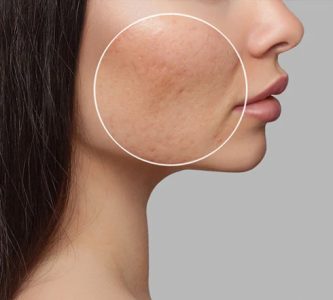Acne and acne scars

Acne is a very common and very treatable skin condition
- Very common skin inflammation involving the hair follicles and oil glands, especially worse during teenager years
- The spots can be small red spots, or much deeper nodular or cystic ones which can result in severe scarring
- It is important to treat acne early to prevent permanent scars
- There are effective topical treatment and oral medication (antibiotics, oral retinoids)
- Lasers can be used for acne scar resurfacing
What is acne?
Acne is a common chronic inflammatory skin condition that involves the hair follicles and oil glands (pilosebaceous unit). Different types of spots appear on the face, neck, shoulders, chest and back.
- Acne starts as comedones (blackheads and whiteheads)
- Acne papules are commonly called spots, pimples and zits.
- Acne can become worse and more severe causing larger and deeper lesions called nodules and cysts
- Acne can lead to permanent scars and skin discolouration
The most common type of acne is acne vulgaris.
Who gets acne vulgaris?
Acne is most prevalent in the adolescent and teenager years, especially during the puberty period, as a result of hormonal surges. It can affect people of all ages and all races. Acne usually improves and gradually clears up after the age of 25 years, although some people continue to have acne as adults. There are some people who develop acne only as adults.
Acne can be psychologically distressing because of how it can cause severe scarring and affects the physical appearance.
Why is acne worse in some people?
Some people have particularly severe acne. This may be because of:
- Genetic factors (family members have bad acne)
- Own immune system reacting to cause severe acne inflammation
- Hormonal factors (higher levels of male/androgenic hormones) due to medical conditions such as polycystic ovaries, psychological stress, Cushing’s syndrome
- Environmental factors such as high humidity, oily thick cosmetics, occlusive headgear
- Excessive dairy products, meat protein and sugars in the diet
- Certain medications may cause acne
Do certain foods cause acne?
Very common query!
Acne is not caused by oily fatty fried foods.
Some studies suggest there is a potential link between certain food we eat and acne, although the evidence is not conclusive.
Several studies have shown benefits in acne from a low-glycaemic, low-protein, low- fat and low-dairy diet.
How do we treat acne vulgaris?
Acne should not be dismissed as just a cosmetic concern or part of growing up process. It is important to seek treatment early for acne to prevent permanent or extensive scarring.
Our dermatologist will individualise treatment plan, which depends on the patient
age and gender, the extent and the severity of the acne, how long it has been present, and response to previous treatments
- For mild acne, treatment includes anti-inflammatory creams (eg benzoyl peroxide, clindamycin, retinoids)
- Mild comedonal acne may benefit from procedures such as chemical peels, and microdermabrasion (Hydrafacial) which can help to cleanse and clear the blackheads/whiteheads.
- Treatment for moderate acne requires additional oral acne antibiotics such as tetracyclines
- Some acne patients may benefit from antiandrogen hormonal treatment such as birth control pill
- Treatment for severe acne may require a course of oral isotretinoin
What is isotretinoin?
Isotretinoin is an oral vitamin A medication, which is most effective in the treatment of severe acne. Originally only used in severe disease, it is now also increasingly prescribed for all grades of acne, especially for those with psychologically distressing acne.
It works by reducing oil production, the size of oil glands, and decreasing inflammation and skin cells clogging up pores. Lower doses can be used to minimise side effects and achieve excellent acne control.
A course of isotretinoin treatment typically lasts 10–12 months, depending on severity and body weight. Large majority of patients will achieve excellent clearance of their acne, with many experiencing long-term remission of acne. Isotretinoin cannot be taken during pregnancy, and proper contraception needs to be strictly adhered to whilst on the medication for patients who are sexually active. Other common side effects include dry lips, skin and dry eyes.
Our dermatologist will discuss with you if you are a suitable candidate for the use of isotretinoin. Your safety whilst taking these tablets will be ensured with close monitoring.
Can lasers treat acne?
Once active acne is well controlled, our dermatologist can discuss laser treatment options to improve the appearance of scars. Fractionated CO2 Laser can be used to treat and resurface pitted scars, deeper scars and skin irregularities. Pigment Pico Laser can also treat acne pigmentation and milder scars. Red acne scars can be treated with Pulsed Dye Laser.
DISCLAIMER:
The information written and published on this website is not intended to substitute the recommendations of a trained professional and does not replace a professional consultation.
It is advisable to undergo a formal consultation to help establish a relationship between the doctor and yourself, accurately determine your concerns/problems, and get the appropriate treatments for them.
It is also imperative to note that the contents of the website with respect to treatments, results and pricing can vary from individual to individual, and can only be accurately determined by the doctor upon diagnosis.
Do note that all medical treatments will only be administered upon proper consultation, with the requirement that patients be above 21 years of age to provide legal consent.
Medical Dermatology
Meet your Dermatologist

Dr Tay Liang Kiat
Dermatologist
Dr Tay Liang Kiat is a fully accredited Dermatologist who specialises in skin cancers, Mohs micrographic surgery, dermatologic and nail surgery, aesthetic dermatology and laser procedures. With more than 20 years of clinical experience, he also manages other aspects of general ambulatory and inpatient dermatology, including eczema, psoriasis, acne, urticaria, hair loss, children skin issues and other complex medical dermatology. In addition, he has expertise in the use of the latest immunotherapy (biologics) treatment for severe eczema, psoriasis and urticaria.




